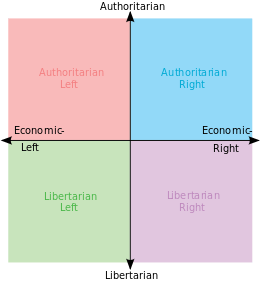Political compass

The political compass is a multi-axis political model, used by the website of the same name, to label or organise political thought on two dimensions. In its selection and representation of these two dimensions, it is similar to the Nolan Chart and Pournelle Chart. The term "Political Compass" is claimed as a trademark by the British website Pace News Limited,[1] which uses responses to a set of 61 propositions to rate political ideology on two axes: Economic (Left–Right) and Social (Authoritarian–Libertarian).[2] The site also includes an explanation of the two-axis system they use, a few charts which place various past and present political figures according to their estimation,[3] and reading lists for each of the main political orientations.
Political model
The underlying theory of the Political Compass is that political ideology may be better measured along two separate and independent axes. The Economic (Left–Right) axis measures one's opinion of how the economy should be run: "left" is defined as the desire for the economy to be run by a cooperative collective agency (which can mean the state, but can also mean a network of communes), while "right" is defined as the desire for the economy to be left to the devices of competing individuals and organizations. The other axis (Authoritarian–Libertarian) measures one's political opinions in a social sense, regarding the amount of personal freedom that one would allow: "libertarianism" is defined as the belief that personal freedom should be maximised, while "authoritarianism" is defined as the belief that authority and tradition should be obeyed.
The labels given to the different fields and axes on the compass are based on long-standing terminology, which can be applied to almost all Western democracies, including the politics of the United States.[4][5][6][7][8][9][10][11][12]
A number of other multi-axis models of political thought exist. Some are based on similar axes to the Political Compass. A similar chart appeared in The Floodgates of Anarchy by Albert Meltzer.[13]
Website
The politicalcompass.org website does not reveal the people behind it, beyond the fact that it seems to be based in the UK;[14][15] at the bottom of any page on the website, it is stated that the Political Compass's copyright belongs to an organisation named "Pace News Limited."[4] According to The New York Times, the site is the work of Wayne Brittenden, a political journalist.[2] According to Tom Utley, writing in The Daily Telegraph, the site is connected to One World Action, a charity founded by Glenys Kinnock.[16] An early version of the site was published on One World Action's web server.[17]
The website does not explain its scoring system in detail and some writers have criticised its validity.[14][16][18][19]
See also
References
- ↑ "The Political Compass". The Political Compass. 2013-10-11. Retrieved 2013-11-01.
- 1 2 The New York Times: Online Diary. December 4, 2003
- ↑ Daily Telegraph: Time to start pounding away at Gordon Brown. 18 August 2007
- 1 2 The Political Compass. "The Political Compass". Retrieved 16 February 2016.
- ↑ Steven Lukes NYU THE GRAND DICHOTOMY OF THE TWENTIETH CENTURY
- ↑ "How to Tell Whether You're Right Wing or Left Wing". wikiHow. Retrieved 16 February 2016.
- ↑ "The Dynamics of Right Wing Politics in America". Global Research. 10 March 2011. Retrieved 16 February 2016.
- ↑ Anonymous. "Democracy and the Threat of Authoritarianism: Politics Beyond Barack Obama". Retrieved 16 February 2016.
- ↑ "The Emerging Authoritarianism in the United States: Political Culture under the Bush/Cheney Administration". Retrieved 16 February 2016.
- ↑ "What is The Libertarian Party?". Libertarian Party. Retrieved 16 February 2016.
- ↑ "Libertarian Party". Democracy Chronicles. Retrieved 16 February 2016.
- ↑ "On Privilege: A Leftist Critique of the Left". Harvard Political Review. Retrieved 16 February 2016.
- ↑ Meltzer, Albert; Christie, Stuart (1970). "Party Lines and Politics". The Floodgates of Anarchy. ISBN 0-900707-03-8.
- 1 2 The Guardian: Shut Up, I'm A Libertarian
- ↑ Political Compass: FAQ Q29
- 1 2 The Daily Telegraph: I'm v. Right-wing, says the BBC, but it's not that simple. 6 June 2001
- ↑ Eight ways to run the country. Brian Patrick Mitchell. Greenwood Publishing Group. 2007. ISBN 978-0-275-99358-0 p143
- ↑ Political Compass: FAQ Q24
- ↑ Eight ways to run the country. Brian Patrick Mitchell. Greenwood Publishing Group. 2007. ISBN 978-0-275-99358-0 p5